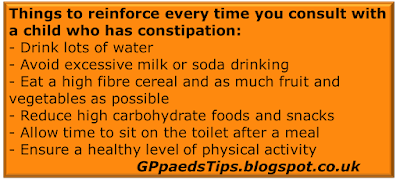Constipation is very common in children over the age of one year old, being prevalent in around 20% of children. It is responsible for many presentations to GPs, Emergency Departments and other unscheduled care providers. Sometimes the family knows that constipation is the problem but often they are perplexed by symptoms that they do not necessarily associate with constipation.
By far the most common perplexing symptom of constipation is abdominal pain. This pain can be acute, chronic or both. It can be severe or mild enough that the child does not articulate their discomfort to the parents.
So, back to the diary: this child who is presenting with what turns out to have constipation has a timeline. Assuming that they presenting for the first time, now in February 2017, these are the relevant dates:
August 2016
This is the time that the child began to become constipated. It is often the case that it seems that the problem has been there for a much shorter period. When the child eventually comes to see you, the parents may have been aware of the abdominal pain for a few days or hours, but it takes a long time to become constipated to the point that symptoms occur. Think of it like a massive ship. It takes a long time for one of these to come to a full stop. Likewise, it takes months for bowels to reach the point that they are loaded and unable to function, which is the point at which they will present to you.
February 2017
The parents will present now because they recognise a problem. This maybe abdominal pain or perhaps they have seen blood on the toilet paper. Often, there will be a reluctance to accept that constipation is the cause of these things. This is for a variety of reasons.
Parents are unlikely to know exactly what a child's bowel habit is. Asking if the child opens their bowels and if this is normal is unlikely to unmask constipation as the villain here. Instead it is important to ask specific questions.
- Does the child strain to pass stool?
- Is it painful for the child to open their bowels?
- Is there ever blood on the stools or toilet paper?
- What do the stools look like?
If they identify type 1, 2 or 3 stool from the Bristol chart, this indicates constipation. If the child is passing only liquid stools, this may be overflow due to severe constipation.
If the problem is most likely constipation, it is also very probable that it is idiopathic constipation. In the absence of red flags, it is usually appropriate to treat without any need for investigation.
The best treatment is macrogol laxatives (1) in increasing doses to achieve easy passage of formed stools. It may be necessary to see this child on a few occasions to get the dose of laxative perfect. The aim is to have the child passing soft, well formed stools easily.
There is a lot to explain in the first consultation. Parents and children often disbelieve that constipation may be causing the child's symptoms. I find that pictures help.
March 2017
By now the symptoms of idiopathic constipation should be improving or possibly gone. This is an important visit because there are two essential outcomes for this child.
1 - Do not stop the macrogol laxatives. It takes a long time to become so constipated that you will go to see a doctor. By the time children present, they have a stretched, weak and numb bowel. If you stop their laxative now it is too soon. NICE recommends 4-6 months of treatment in order to restore the shape, strength and sensation to the colon before the child is weaned off medication.
2 - Reinforce the message about the importance of diet and toileting. Of course you covered this when you first started the medication, but for ten different reasons, it is unlikely that this message has been fully heard and understood.
August 2017
This may seem like a long time away, but this is when it might be time to reduce and stop the laxatives. If the child has been taking their macrogol for about six months, then the shape, strength and sensation should have returned. This gives them the best possible chance of being constipation free. Diet and lifestyle are just as important at this stage as when they were first diagnosed. Treating and preventing constipation is a lot of hard work but the results are worth it.
Edward Snelson
Specialist Spitilomancer
@sailordoctor
Please note that babies who struggle to pass stool are often experiencing a normal physiological phenomenon called dyschasia.
References
- Constipation in children and young people: diagnosis and management, NICE CG99
- The Essential Clinical Handbook for Common Paediatric Cases: A Practical Guide to Assessing Children in General Practice, the Paediatric Assessment Unit and the Emergency Department, BPP Learning Media









